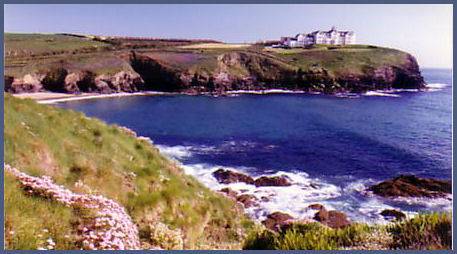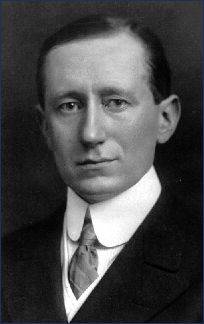Poldhu Cove
OS Grid ref:- SW6619
 On the cliffs of Poldhu Cove, the birthplace of wireless telegraphy, stands Marconi's memorial, a granite column, the solitary reminder of the momentous events which occured there, since the historic buildings were dismantled in 1937, although their concrete foundations remain.
On the cliffs of Poldhu Cove, the birthplace of wireless telegraphy, stands Marconi's memorial, a granite column, the solitary reminder of the momentous events which occured there, since the historic buildings were dismantled in 1937, although their concrete foundations remain.
Guglielmo Marconi erected a wireless staion of a size never before believed possible on the site in 1900. Shortly after midday on 12th December, 1901, radio signals sent from here spanned the Atlantic and were received by Marconi at Signal Hill, St. John, Newfoundland, he distinguished three faint clicks through the earphones of his wireless receiver, the Morse Code letter "S".
Wireless telegraphy was later to play a vital part in the First World War. In 1924, the Marconi-Franklin beam system was also transmitted from Poldhu, which revolutionised long-range radio communication. Short wave beam systems followed. The coaxial cable, an integral feature of television installation was later devised as a result of research carried out at Poldhu.
The Marconi Centre was opened on 12th December, 2001, a hundred years to the day when the first radio transmissions were sent from Poldhu. The centre, which provides a permanent commemoration and acknowledgement of Marconi's work and achievements was funded by the National Trust and the Marconi Company and contains many displays and a great deal of information. The centre also provides a new operating base for the local amateur radio club.
The beach at Poldhu, (Cornish for Black Pool) a popular location with surfers, is backed by sand dunes and a small car park is situated by the beach, lifeguards operate July - August. The area around the cove offers attractive coastal walks with spectacular views.
Guglielmo Marconi
(25 April 1874 - 20 July 1937)
 Italian inventor and electrical engineer, Guglielmo Marconi is known for his pioneering work on long-distance radio transmission and for the development of Marconi's law and a radio telegraph system.
Italian inventor and electrical engineer, Guglielmo Marconi is known for his pioneering work on long-distance radio transmission and for the development of Marconi's law and a radio telegraph system.
He is often credited as the inventor of radio, and shared the 1909 Nobel Prize in Physics with Karl Ferdinand Braun. An entrepreneur, businessman, and founder in Britain in 1897 of The Wireless Telegraph & Signal Company, Marconi succeeded in making a commercial success of radio by innovating and building on the work of previous experimenters and physicists. In 1929 the King of Italy ennobled Marconi as a marquis.
Marconi was born into the Italian nobility as Guglielmo Giovanni Maria Marconi in Bologna on 25 April 1874, the second son of Giuseppe Marconi, an Italian aristocrat and his Irish wife, Annie Jameson. Marconi founded the London-based Marconi Telegraph Company in 1899. Though his original transmission traveled a mere mile and a half, on December 12, 1901, Marconi sent and received the first wireless message across the Atlantic Ocean, from Cornwall to a military base in Newfoundland.
His experiment was significant, as it disproved the dominant belief of the Earth's curvature affecting transmission. Beginning in 1902, Marconi worked on experiments that stretched the distance that wireless communication could travel, until he was finally able to establish transatlantic service from Glace Bay in Nova Scotia, Canada, to Clifden, Ireland. For his work with wireless communication, Marconi shared the Nobel Prize in Physics with Karl Braun in 1909. Not long after, Marconi's wireless system was used by the crew of the RMS Titanic to call for assistance.
In addition to his groundbreaking research in wireless communication, Marconi was instrumental in establishing the British Broadcasting Company, formed in 1922. He was also involved in the development of radar.